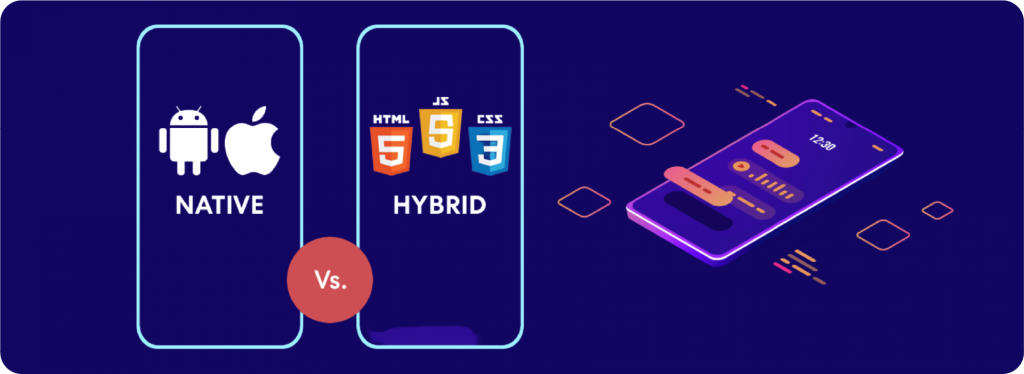When developing a mobile app for your business, one of the first decisions you’ll need to make is whether to go for a native app or a hybrid app. Both types of apps offer different advantages and limitations, and choosing the right one depends on various factors such as your target audience, budget, time constraints, and long-term business goals.
In this blog, we’ll explore the key differences between native and hybrid apps, helping you make an informed decision on which approach is best suited for your business needs.

1. What Are Native Apps?
A native app is built specifically for a particular platform, such as iOS or Android, using platform-specific programming languages. For iOS, developers use Swift or Objective-C, while for Android, they typically use Java or Kotlin. Native apps are downloaded from an app store and installed directly onto a user’s device.
Advantages of Native Apps:
- Superior Performance: Since native apps are optimized for specific platforms, they offer better performance, speed, and responsiveness.
- Access to Device Features: Native apps have full access to a device’s hardware and features, such as the camera, GPS, microphone, and more. This allows developers to create more feature-rich and complex apps.
- Better User Experience: Native apps can take full advantage of the platform’s design guidelines and user interface elements, ensuring a smoother, more consistent experience for users.
- Offline Functionality: Native apps can be used offline, depending on how they are designed, which is a significant advantage for certain types of applications.
Disadvantages of Native Apps:
- Higher Development Costs: Since native apps are developed separately for each platform, development costs can increase significantly if you need to create apps for both iOS and Android.
- Longer Development Time: Developing two separate apps for different platforms requires more time, which can delay your app’s time to market.
- Maintenance Complexity: Maintaining and updating multiple codebases for different platforms can be more challenging and time-consuming.
2. What Are Hybrid Apps?
A hybrid app is a combination of web and native apps, typically built using web technologies such as HTML, CSS, and JavaScript. These apps are designed to work across multiple platforms (iOS, Android, and web) using a single codebase. Hybrid apps are wrapped in a native container, which allows them to be installed from app stores just like native apps.
Hybrid app development frameworks like React Native, Flutter, and Ionic are popular choices for building cross-platform apps.
Advantages of Hybrid Apps:
- Faster Development: Since hybrid apps use a single codebase for multiple platforms, they can be developed more quickly, saving both time and resources.
- Lower Development Costs: Developing one app for multiple platforms means lower development costs, especially for businesses on a tight budget.
- Faster Updates: Since the codebase is unified, updating and maintaining the app is easier and more cost-effective.
- Wide Platform Reach: Hybrid apps can run on iOS, Android, and even the web, increasing the potential user base and making it easier to reach a broader audience.
Disadvantages of Hybrid Apps:
- Compromised Performance: Since hybrid apps rely on web technologies wrapped in a native container, they tend to be less performant than native apps, especially for resource-intensive applications such as games or high-graphic apps.
- Limited Access to Device Features: While hybrid apps can access certain device features, they may not have the same level of access or functionality as native apps. Certain features might not be available or might not perform as well.
- Inconsistent User Experience: Hybrid apps can sometimes feel less integrated into the platform’s design guidelines, leading to inconsistencies in the user interface and user experience (UX).
3. Which One Is Right for Your Business?
Now that we’ve discussed the advantages and disadvantages of both native and hybrid apps, let’s explore which type of app is right for your business. Consider the following factors before making a decision:
1. Budget and Resources
- Native Apps: If you have a larger budget and resources, native apps are a great choice as they offer better performance, a more refined user experience, and access to device-specific features.
- Hybrid Apps: If you’re on a tighter budget or have limited development resources, hybrid apps are a more affordable option. They allow you to target multiple platforms with a single codebase.
2. Time to Market
- Native Apps: Native apps require separate development for iOS and Android, which can extend the time to market. If you need your app to be launched quickly, native apps may not be the best choice.
- Hybrid Apps: Hybrid apps can be developed much faster since you only need one codebase for both iOS and Android. If time is a critical factor, hybrid apps are ideal.
3. Desired User Experience and Performance
- Native Apps: If your app demands high performance, such as gaming apps, apps that use intensive graphics, or apps with complex functionalities, native apps are the way to go. They offer the best performance and user experience.
- Hybrid Apps: If your app does not require intense graphics or high-end performance, a hybrid app can still provide a decent user experience while being more cost- and time-efficient.
4. Access to Device Features
- Native Apps: Native apps offer better access to device hardware and features, such as the camera, sensors, GPS, and microphone. If your app relies heavily on these features, a native app would be the better choice.
- Hybrid Apps: While hybrid apps can access some device features, they might not provide the same level of access as native apps. If your app does not require deep integration with device features, hybrid apps can suffice.
5. Long-Term Scalability
- Native Apps: If you plan to build a complex app that evolves over time with more features, native apps offer better scalability. They allow you to make use of platform-specific tools and updates, ensuring your app can scale efficiently.
- Hybrid Apps: While hybrid apps can be scaled, they might face limitations if the app becomes too complex or resource-heavy. However, they are still suitable for most business apps, especially if the app’s functionality is straightforward.
4. Making the Right Choice for Your Business
Ultimately, the decision between native and hybrid apps depends on your business goals, the nature of your app, your target audience, and your budget. Here’s a quick summary to help you choose:
- Choose Native Apps if:
- You need high performance and an optimized user experience.
- Your app requires extensive access to device hardware or features.
- You have a larger budget and a longer development timeline.
- Choose Hybrid Apps if:
- You need to launch your app quickly on multiple platforms.
- You have a limited budget or development resources.
- Your app doesn’t require complex graphics or advanced hardware features.
Conclusion
Choosing between a native and hybrid app depends on the specific needs of your business. If you want a more polished and performance-driven app, and you’re willing to invest more time and resources, a native app might be the better option. On the other hand, if your goal is to quickly launch a cost-effective app across multiple platforms, hybrid development is a solid choice.
At CBS Pakistan, we specialize in delivering both native and hybrid app development solutions, ensuring that your app aligns with your business objectives. Whether you need a feature-rich native app or a fast-to-market hybrid app, our experienced team is ready to turn your vision into reality. Contact CBS Pakistan today to start building your mobile app for success!


